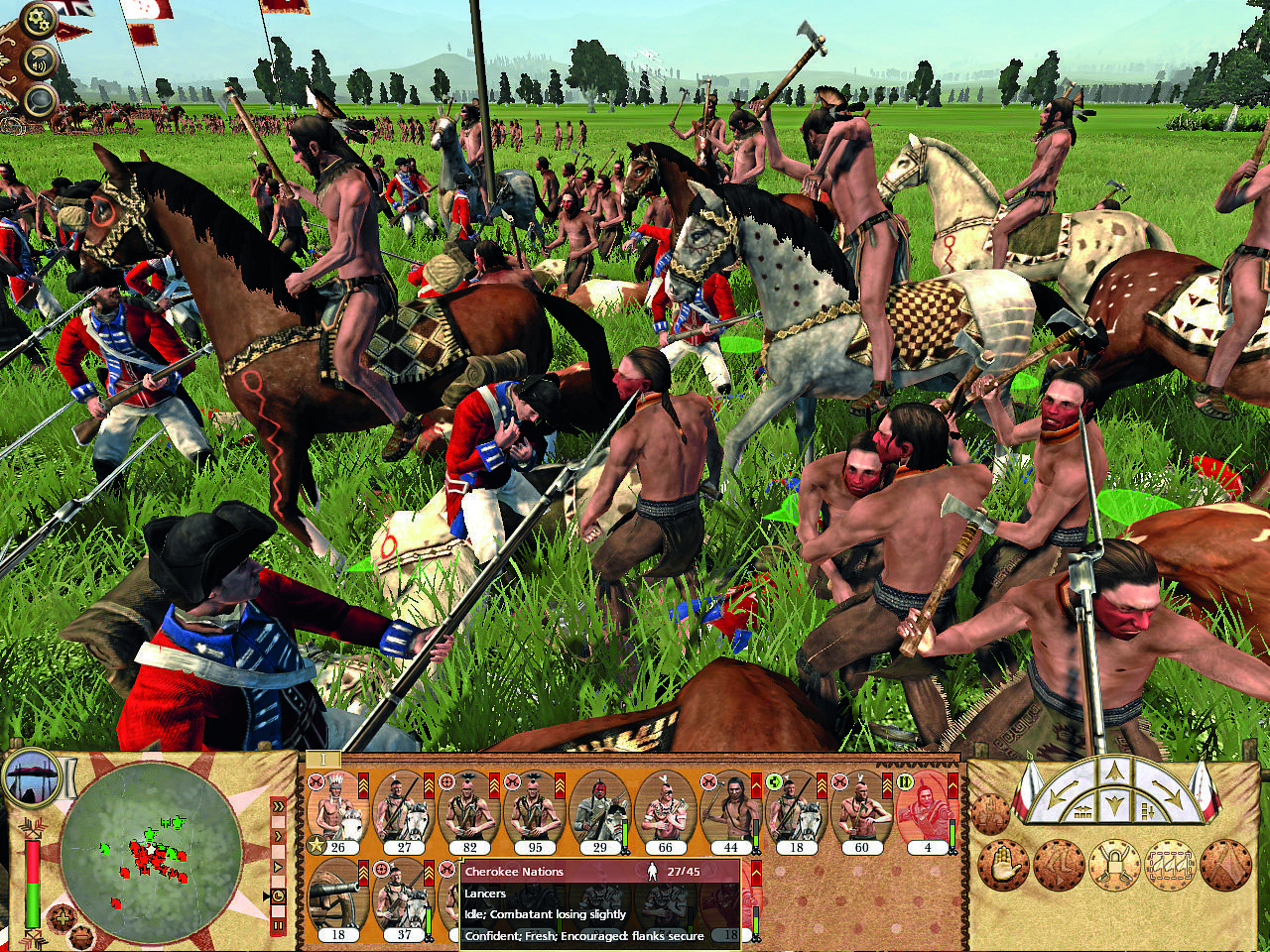GamesRadar+ Verdict
Pros
- +
Multi-layered strategy
- +
Absolutely immense in scope
- +
Intensely detailed in every aspect
Cons
- -
Not good for just "a quick go"
- -
Won't be easily mastered
- -
Unfortunately
- -
not quite done yet
Why you can trust GamesRadar+
This is the grandest, most spectacular work of strategy gaming on the PC. If you’ve not tackled a Total War game before, or assume that they’re not for you, we challenge you to play Empire and not be impressed, or even fundamentally changed by the experience. This is one of the most playable, and therefore important and accomplished strategygames ever created.
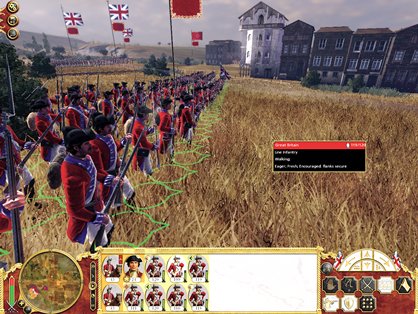
Total War occupies its own territory between Civ, classic RTSes, and the hex-based wargames armchair generals get all excited about. It is both a vast turn-based historical escapade and a gritty real-time battlefield engine that delivers the most cogent picture of mass conflict we’ve yet seen. The field of conflict in Empire, most global of the Total War games, is the 18th century. Assuming you’re going to play the gigantic Grand Campaign, you’ll start in 1700 and have a turn every six months until 1799. At the back of your mind, you’re always aware of that clock, ticking down toward victory or defeat.
If you’re playing as Britain, as we did, victory means controlling Egypt and a chunk of both India and North America. This is a game in itself. And when you’re done there, you’ll want to try a different nation, and its different victory conditions. Whatever you do, this game is a colossal undertaking. Completing a campaign is one of those gaming exploits that you know will be with you for the rest of your life, simply because it will consume so much time. Even when you’re not playing, you’re thinking about it. Planning, plotting your colonial ambitions.
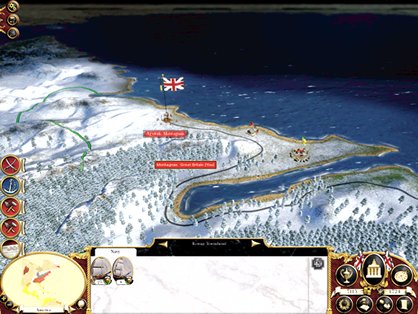
Yes, colonial. Unlike the Medieval and Roman-era empire building, these are very much colonial enterprises. Empire takes a great deal of its design philosophy from the events and trends of its era, and that real history is reflected in the core challenges different nations face, and in the smaller tasks you’ll have to deal with to grasp the upper hand in war. Playing as the European powers, for example, places you in a fascinating position – one that seems astonishingly close to how the real colonial powers must have played their real world game. Your fortune lies across oceans, but you cannot lose your foothold in Europe. As Great Britain our fate was closely tied to that of the Thirteen Colonies in North America, and only by being a remarkably strong international power were we going to keep them as a protectorate.
What’s more, we knew that we could not afford a land or sea war with local European powers, and spent many early years butteringup France and Spain with gifts to reduce the pressure that hostilities might place on our shipping. Empire for Great Britain means a powerful Royal Navy – in the game, just as in real life. Play as land-locked Poland, on the other hand, and you face a different challenge. You’ll want to pick off all the smaller one-state nations,one at a time, before facing down the Russian Bear.
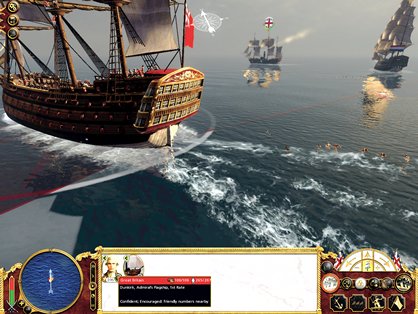
There had been rumblings about Total War being simplified for the US market, especially with its introductory mini-campaign ‘The Road to Independence’. This may indeed have been included to guide newcomers, but don’t think the complexity of the main game has been sacrificed. Empire: Total War is more, and better, than we’ve ever had before. The Creative Assembly do not seem to have shirked their responsibility, or ever stepped back from including more features, or more detail. Empire is the opposite of dumbed down. It has a superabundance of smart gaming.
And while it feels familiar, Empire manages to deliver more nuance on the campaign map than ever before. What’s most immediately obvious is the effect of international trade. While some trade does occur between trade partners over land, it’s the maritime trade routes that really print money.
The trade routes arc around the huge main map, which is itself divided into two principle sections: North America and Eurasia. The core map stretches from Iceland on the top left to Sri Lanka on the bottom right. Scrolling across an empire that spans this vast distance is a pleasure indeed. Red, yellow and green status marks materialise to show who you’re sharing that sea-route with and how threatened you are. Pirates camping the route will need to be physically removed.
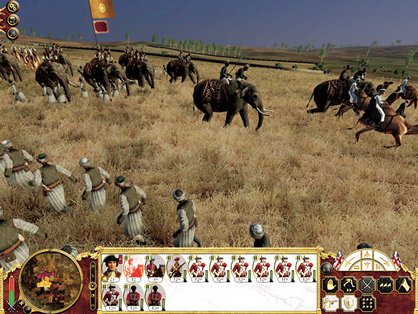
The trade routes then snake off into the rest of the world, including the four ‘trade regions’ – South America, the Ivory Coast, the straits of Madagascar, and the East Indies. These are purely coastal regions, in which fleets can be placed to generate money. It’s then down to your diplomacy, and the grit of your admirals, to keep those trade routes open, and to keep your nation rich. Once at war with the Ottoman Empire, our Great Britain campaign saw us bottling up the Ottoman fleet in the Mediterranean, keeping our Atlantic traders safe from attack. Had we picked a fight with Portugal or Spain, with their Atlantic-facing coastlines, things would have been very different.
Inevitably, the real action still goes down in the main, land-based conquerable regions of the campaign map. These are far more detailed than anything we’ve seen previously. Each region still has a capital, but there are now separate ports, towns, and farms. All of these can be built upon and upgraded, bringing you farming estates, ports for military or trade use, mines, schools, centres for religious learning, or even defensive forts.
More info
| Genre | Strategy |
| Description | Immense and intensely detailed, Empire: Total War is a must buy for strategy gamers. |
| Platform | "PC" |
| US censor rating | "Teen" |
| UK censor rating | "16+" |
| Release date | 1 January 1970 (US), 1 January 1970 (UK) |
